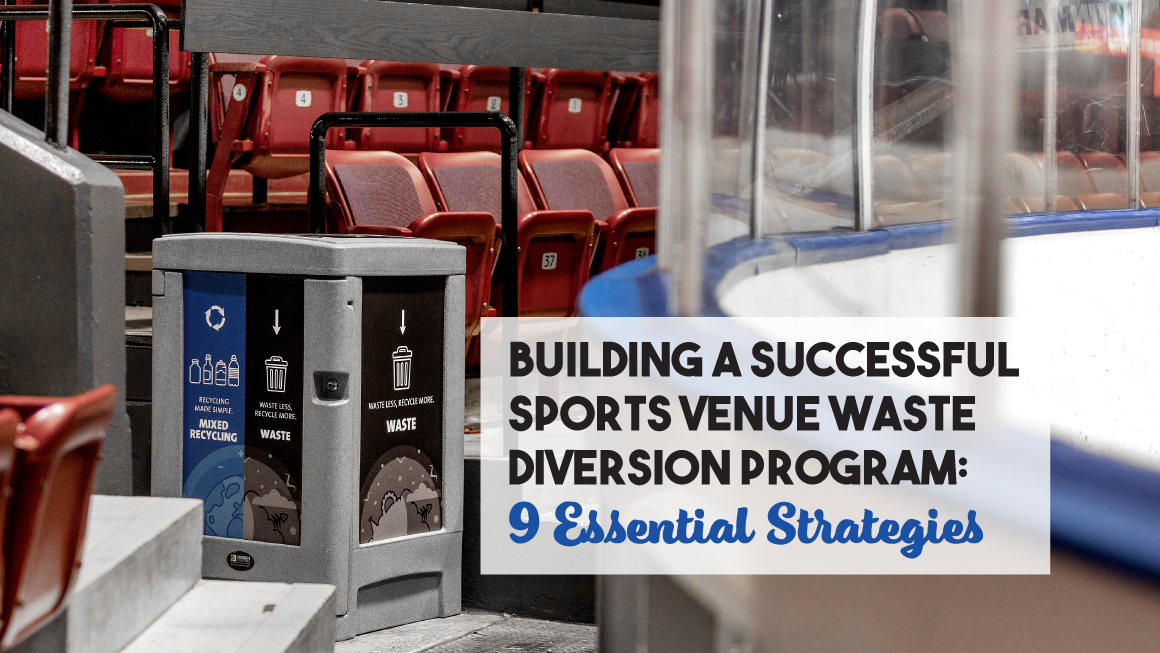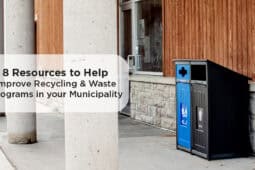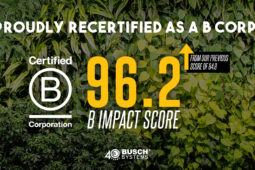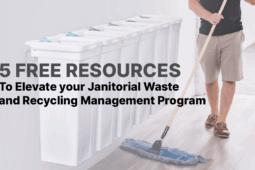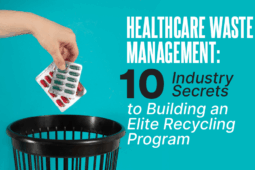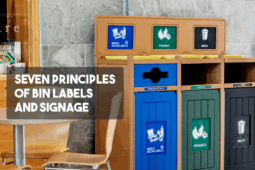For over 35 years, we’ve been at the forefront of developing top-tier recycling and waste management solutions for sports venues. Through this experience, we’ve identified nine essential strategies to help you create an efficient and impactful zero-waste program for your stadium—one that not only supports environmental sustainability but also saves money in the process.
The Reality of Waste in Sports Venues
Sports facilities are major generators of waste, much of which can be easily recycled or repurposed with a well-structured program. Implementing a comprehensive waste management plan can significantly reduce the amount of trash sent to landfills and ensure recyclable items are processed into new products. Consider these staggering statistics:
- Professional Leagues: Waste Management estimates that the four major U.S. professional leagues (NFL, MLB, NBA, NHL) generate roughly 35,000 metric tons of carbon dioxide (CO2) annually from fan waste activities alone.
- Olympic Games: The 2008 Beijing Olympics generated over 14,000 tons of waste during the event period.
- College Football: The University of Tennessee reports generating 15 tons of waste per game, while Ohio State produces nearly 23 tons per game.
- Sustainability Gaps: According to a study published in the Journal of Athletic Training, 59% of respondents acknowledged the substantial waste generated by athletic activities, yet only 38% felt adequately educated on sustainable practices to make meaningful changes.
In today’s landscape, where environmental sustainability is a top priority, it’s critical that stadiums implement effective waste diversion strategies. Doing so not only mitigates waste production but also reduces operational costs and positions your stadium as a sustainability leader.
9 Essential Strategies for an Effective Stadium Waste Diversion Program
- Conduct a Comprehensive Waste Audit
The foundation of any successful waste management program is a thorough waste audit. Begin by identifying and quantifying the types of waste generated across your facility. Use a detailed map of your grounds to pinpoint key areas such as parking lots, training facilities, bleachers, suites, and concessions. This will help you understand where waste is coming from and how to address it effectively.
- Assemble a Green Team
If your facilities team is stretched thin, consider forming a dedicated Green Team—a group of employees or community volunteers tasked with driving sustainability initiatives. This team should be equipped with clear goals, measurement tools, and formal oversight to ensure long-term success. A motivated and well-organized Green Team will help build momentum and support for your program.
- Communicate the Program to Fans
Sports venues have the unique advantage of controlling the types of materials entering and leaving the facility. Use this to your benefit by standardizing recycling protocols and communicating them effectively to fans. Utilize signage, in-game announcements, posters, and social media campaigns to educate fans and ensure proper waste disposal. A visually engaging signage system with clear instructions can dramatically reduce contamination rates and boost participation.
- Adjust Your Operational Habits
Small operational changes can make a significant impact. Consider the following adjustments:
- Use compostable containers in concession areas to reduce plastic waste.
- Place recycling bins in tailgating areas to capture cans and bottles.
- Replace bottled water sales with water refill stations and promote reusable drinkware.
- Install LED lighting to reduce energy consumption and waste from frequent bulb replacements.
- Find Creative Solutions for Unique Waste Items
Certain items can be particularly challenging to recycle. Look for innovative solutions to address these. For instance, the USTA worked with a recycler to process tennis ball cans, which consist of multiple plastic types and a metal rim. Identify problematic waste streams at your venue and collaborate with vendors and haulers to find sustainable alternatives or recycling options.
- Minimize Single-Use Plastics and Manage Organics
The phase-out of single-use plastics is a growing trend among sports venues. Hard Rock Stadium in Miami, for example, eliminated 99.4% of single-use plastics by 2020, removing over 2.8 million plastic items annually. Composting is another strategy—work with your haulers to establish an organics collection program for food and landscaping waste, or switch to certified compostable serviceware to further reduce landfill contributions.
- Optimize Disposal Practices
Traditional waste removal relied heavily on sending mixed materials to landfills. Today, you can partner with specialized haulers that focus on organics collection or invest in on-site composters to manage food waste. Implementing efficient disposal practices will not only cut down on waste but can also lead to cost savings.
- Select the Right Recycling Stations and Placement
Choosing the right containers is crucial for program success. Ensure that recycling and compost bins are always placed alongside trash bins to reduce contamination and make it easy for fans to separate their waste. Customize bins with restrictive openings, clear labels, and signage to guide users. Strategically place bins in high-traffic areas such as concessions, hallways, and entrances for maximum visibility and convenience.
- Set Sustainability Standards for Vendors and Sponsors
You have considerable control over the materials entering your stadium. Work with vendors to eliminate non-recyclable packaging and prioritize reusable or compostable alternatives. Engage sponsors to support green initiatives; many are willing to invest in sustainability programs for brand alignment. Partnering with sponsors and vendors on sustainable practices not only strengthens your waste diversion program but also enhances your brand image.
Driving Sustainable Success
Launching a robust waste diversion program in your sports venue is more than an operational upgrade—it’s a commitment to environmental stewardship and long-term sustainability. By implementing these nine strategies, you’ll set your stadium on a path to reduced waste, lower operational costs, and stronger engagement with eco-conscious fans.
Ready to take the next step? Contact our Sports Stadium Waste Management Specialists for tailored guidance and support as you embark on your journey toward a zero-waste facility. Together, we can build a cleaner, greener future for your stadium and the communities it serves.
